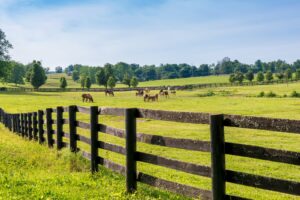When I decide which subject I will write about, the decision is made usually after talking to a client. At that point, I sit down and talk to my computer as if you were sitting across from me.
Welcome to my office.
Horse owners have been led to believe that there is a magical feed or supplement out there that can work wonders on its own. There are some that can perform solely due to the “quality” of the ingredients. As I have always said, we can eat mac and cheese three times a day and still get through the day, but we will tire more quickly, our skin and hair will suffer, and our immune system might not be up to snuff. If we change our diet to a higher quality diet, well, things get better. Same with our horses.
There are feed and supplement products on the market that tell you that if you feed them, they will provide a better topline. That is a half truth. The amino acid profile in that feed cannot provide topline on its own, but it will provide the tools if you provide the work. As your horse works, muscle tissue is damaged, and often that can leave you with a sore horse. This is when the amino acids travel into the muscle fibers and fibrils. The quality profile then repairs and builds quality muscle and, in most cases, prevents leaving you with a sore horse. The best time to feed this type of amino acid supplement is within 30 minutes after a workout. By doing this, your horse can absorb up to 85% of the supplement while the muscle fibrils, whereas only 30% is absorbed if fed only as a topdress. Proper work, collection, and quality nutrition provides a better topline.
There is also the myth out there that high protein diets make a horse high and excitable. Another half truth. This goes back to the mid 1980s and earlier, before we had high fat diets. People bought feed just on protein percentage, and some still do. Back in the day, a 10% feed was for pleasure/trail horses, a 12% feed was for moderate work, a 14% feed was for performance horses, and a 16% feed was for mare and foals. That being said, a 14% feed had an extremely high carbohydrate value. Once the horse’s heart rate started to rise, carbs kicked in, and here we go!!! So you can see how we can draw a connection between protein and excitability. Nowadays, we can have a 14% protein feed that has as low as 8% carbs. Fat can be called a calm energy. Feeding a high fat feed does not guarantee a calm horse, as personality has to be figured in as well.
Feed and supplements do not work the same way on all horses. Sometimes you have to try different combinations in order to see results. It can also take up to 120 days for a specific supplement to kick in. If you don’t see results in two to four weeks after starting a supplement, be patient. Results may be just around the corner. This is why horse owners should talk to professionals instead of relying on what the neighbor or friend uses, and this could save you a lot of money. There is much clinical information available, but it may not be at your fingertips.
And as always, if you have any questions or concerns, drop me a email, text, or phone call. Take care and stay safe.
Saddle up!






